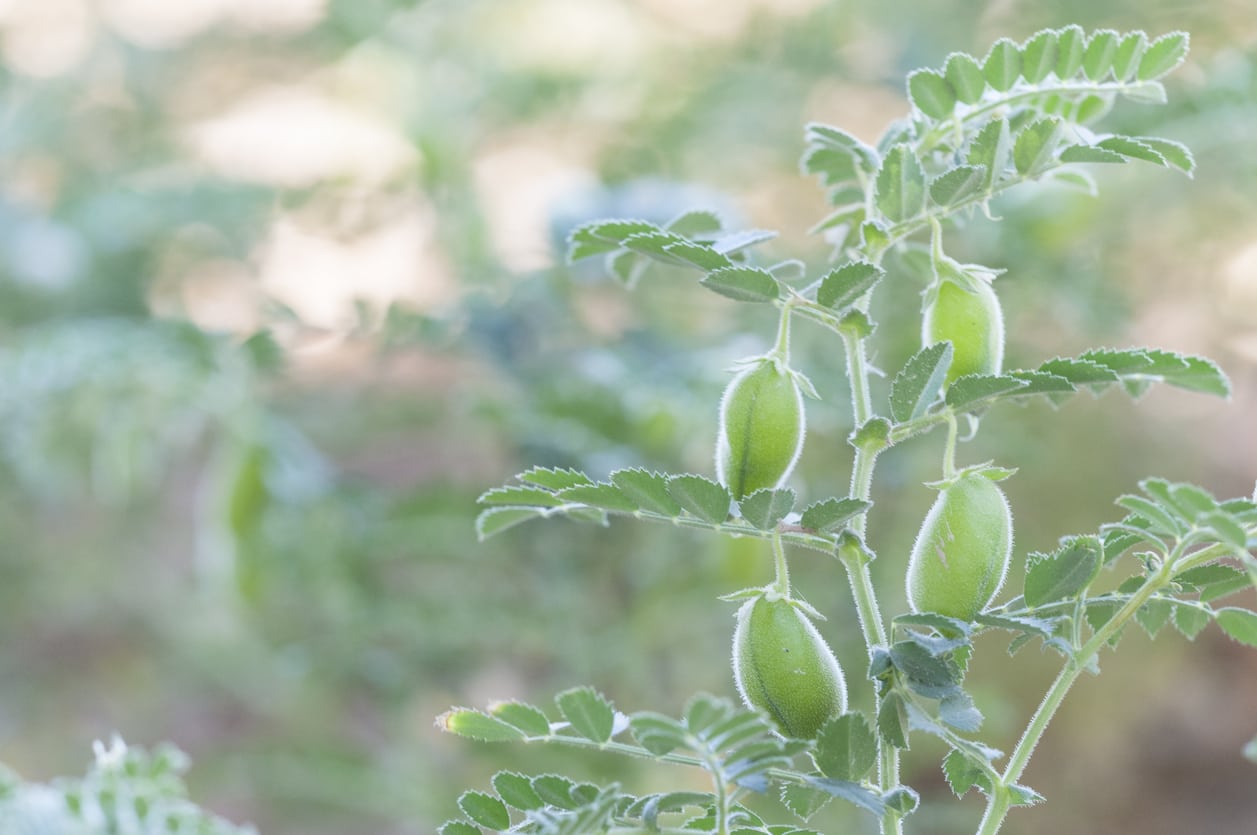Garbanzo Bean Information – Learn How To Grow Chickpeas At Home

Tired of growing the usual legumes? Try growing chickpeas. You’ve seen them on the salad bar and eaten them in the form of hummus, but can you grow chickpeas in the garden? The following garbanzo bean information will get you started growing your own chickpeas and learning about garbanzo bean care.
Can You Grow Chickpeas?
Also known as garbanzo beans, chickpeas (Cicer arietinum) are ancient crops that have been cultivated in India, the Middle East and areas of Africa for hundreds of years. Chickpeas need at least 3 months of cool, but frost-free, days to mature. In the tropics, garbanzos are grown in the winter and in cooler, temperate climes, they are grown between spring to late summer. If the summers are especially cool in your region, it may take up to 5-6 months for the beans to get mature enough to harvest, but that isn’t any reason to shy away from growing nutritious, delicious chickpeas. Ideal temperatures for growing chickpeas are in the range of 50-85 F. (10-29 C.).
Garbanzo Bean Information
About 80-90% of chickpeas are cultivated in India. In the United States, California ranks number one in production but some areas of Washington, Idaho and Montana are also now growing the legume. Garbanzos are eaten as a dry crop or a green vegetable. The seeds are sold either dry or canned. They are high in folate, manganese and rich in protein and fiber. There are two main types of chickpea cultivated: kabuli and desi. Kabuli is more commonly planted. Those with disease resistance include Dwelley, Evans, Sanford and Sierra, although Macarena produces a larger seed yet is susceptible to Ascochyta blight. Chickpeas are indeterminate, which means they can bloom until frost. Most of the pods have one pea, although a few will have two. Peas should be harvested by late September.
How to Grow Chickpeas
Garbanzo beans grow much like peas or soybeans. They grow to about 30-36 inches (76-91 cm.) tall with pods that form on the upper portion of the plant. Chickpeas do not do well with transplanting. It is best to direct sow the seeds when the soil temperature is at least 50-60 F. (10-16 C.). Select an area in the garden with full sun exposure that is well-draining. Incorporate plenty of organic compost into the soil and remove any rocks or weeds. If the soil is heavy, amend it with sand or compost to lighten it up. Sow seeds to a depth of one inch (2.5 cm.), spaced 3 to 6 inches (7.5 to 15 cm.) apart in rows spaced between 18-24 inches (46 to 61 cm.) apart. Water the seeds in well and continue to keep the soil moist, not sodden.
Garbanzo Bean Care
Keep the soil evenly moist; water only when the top layer of soil is dry. Do not water overhead of the plants lest they acquire a fungal disease. Mulch around the beans with a thin layer of mulch to keep them warm and moist. Like all legumes, garbanzo beans leach nitrogen into the soil which means they do not require additional nitrogen fertilizer. They will benefit, however, from a 5-10-10 fertilizer if a soil test determines it is needed. The chickpeas will be ready to harvest about 100 days from sowing. They can be picked green to eat fresh or, for dried beans, wait until the plant turns brown before collecting the pods.
Gardening tips, videos, info and more delivered right to your inbox!
Sign up for the Gardening Know How newsletter today and receive a free copy of our e-book "How to Grow Delicious Tomatoes".

Amy Grant has been gardening for 30 years and writing for 15. A professional chef and caterer, Amy's area of expertise is culinary gardening.
-
 Looking For Plants To Give You The Soft And Fuzzies? Try These 5 Fuzzy Leaf Plant Options
Looking For Plants To Give You The Soft And Fuzzies? Try These 5 Fuzzy Leaf Plant OptionsLovers of texture, drama, silver foliage and tactile plants will adore these special sensory garden additions. These fuzzy leaf plant options will leave you all aglow
By Susan Albert
-
 Get Ready For A Summer Of Hummers! Grow These Full Sun Hummingbird Plants and Flowers
Get Ready For A Summer Of Hummers! Grow These Full Sun Hummingbird Plants and FlowersIf you’re lucky enough to enjoy a sunny backyard, make sure you are maxing out on your pollinator opportunities and grow these full sun hummingbird plants and flowers
By Tonya Barnett